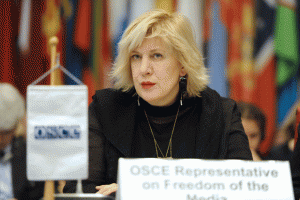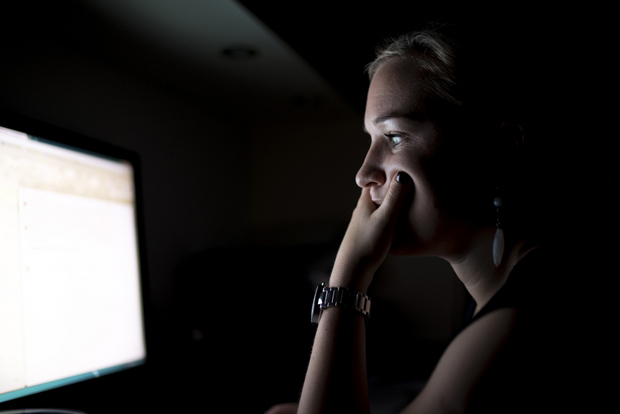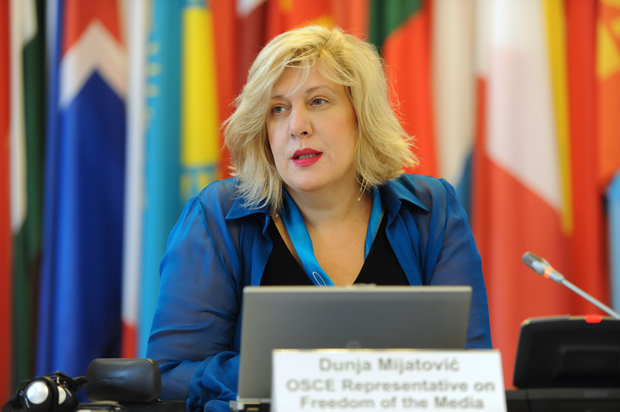1 Oct 2015 | European Union, mobile, News and features

Dunja Mijatovic is the OSCE Representative on Freedom of the Media. (Photo: OSCE/Micky Kroell)
Each autumn, more than 1,000 government and civil society representatives from 57 countries of the OSCE get together in Warsaw for a two-week discussion on a wide variety of human rights issues. The purpose of the meeting is to scrutinize each country’s performance on human rights standards they signed up to in areas such as free expression, free media and the panoply of basic rights prevalent in modern, liberal societies. It is designed to be a thoughtful and lively event that gets to the heart of implementing states’ commitments on the issues.
This year the first topic was dedicated to freedom of expression and the keynote speaker, Danish human rights lawyer Jacob Mchangama, raised “the issue du jour”: “Does a genuine commitment to tolerance, equality and nondiscrimination really depend on restricting the very freedom that has made possible the articulation and spread of new and progressive ideas from religious toleration in 17th century Europe, the abolishment of slavery, the equality of the sexes, criticism of apartheid and the rights of LGBT people?”
The issue, of course, is whether we need the spate of new laws enacted worldwide designed to somehow strike a balance between the right of free expression and the desire to weed out intolerance and hate in society.
In the wake of the Charlie Hebdo massacre in January, the answer to Mchangama’s question may well form the superstructure of the rights to free speech in the years to come.
We don’t need new laws. Indeed, it is time we stop looking at unbridled speech as something that promotes intolerance. We should see it as an opportunity to protect the rights of minorities and marginalised people to speak when the powerful are making distressing noises.
My reasoning is based on the simple view that when it comes to media freedom, those who govern least, govern best.
Even the best-intentioned laws cannot prevent intolerant speech. And general notions such as “hate speech” preferably should be avoided because they can be arbitrarily interpreted.
It is a decidedly New Age thought, likely first made popular by the 19th century essayist Henry David Thoreau in his essay on Civil Disobedience.
But today it is commonly thought that laws criminalising hate speech are beneficial to marginalized groups that need state protection. In reality, it is the marginalized groups who need the freedom of speak without fear of prosecution to press their causes and affirm their rights in society.
As Mchangama said in his address: “The freedoms that (sometimes) allow bigots to bait minorities are also the very freedoms that allow Muslims and Jews to practice their faiths freely. By further eroding these freedoms, no one is more than a political majority away from being the target rather than the beneficiary of laws against hatred and offence.”
Indeed, a significant development post-Charlie Hebdo has been the distressing comments by some that openly suggested the magazine’s staff “had it coming to them” for publishing illustrations satirising the prophet Muhammad. Just think of it: the victims of an outrageous act of silencing speech actually became, in some people’s eyes, the guilty ones.
It is time for some civility in the chaotic world of free speech. As I wrote shortly after the attack: “Intolerant speech should be primarily fought with more speech.” I still believe that is the foundation of any attempts to regulate content.
Following that line, I suggested, among other things, that participating states (the member countries of the Organization for Security and Co-operation in Europe):
· Refrain from banning any form of public discussion or critical speech, no matter what it refers to;
· Take all possible measures to fight all forms of pressure, harassment or violence aimed at preventing opinions and ideas from being expressed or disseminated; and
· Eliminate restrictions to freedom of expression on the exclusive grounds of hatred, intolerance or potential offensiveness. Legislation should only focus on speech with can be directly connected to violent actions, harassment or other forms of unacceptable behavior against communities or certain parts of society.
My full statement on this issue.
27 Aug 2015 | Europe and Central Asia, mobile, News and features

Female journalists and bloggers are increasingly being singled out and fiercely attacked online. (Photo: OSCE)
In a new online column for Index on Censorship, Dunja Mijatović, OSCE Representative on Freedom of the Media, discusses relentless attacks on women journalists, and the impact on their lives.
No job comes without sacrifices, but how many downgrading comments, criticism or even threats can one person take before it becomes too much?
Just consider the experiences of a female journalist that I know:
She had her phone number shared on dating websites, her email and other accounts were hacked, she received death threats on Skype, the website publishing her articles was hacked and a sex video was posted with the implication that she had participated in an orgy. Anonymous articles with lies about her and her family were also posted online.
Imagine being forced to shut down your accounts on social media platforms because of such massive attacks with detailed images of rape and other forms of sexual violence.
At one point, you would probably be inclined to ask yourself if it is really worth it. Is this a career I want to continue to pursue?
In the past few years, more and more female journalists and bloggers have been forced to question their profession. Male journalists are also subject to hate speech and online abuse, but research findings suggest that female journalists face a disproportionate amount of gender-based threats and harassment on the internet. They are experiencing what Irina Bokova, director-general of UNESCO, has described as a “double attack”: they are being targeted for being both a journalist and a woman.
How do these attacks affect female journalists’ lives, their work and society in general? Journalists are used to being in the frontline of conflict and they often deal with difficult and even dangerous situations. But what if you cannot shield yourself from these threats? What if the frontline became your own doorstep, your office or your computer screen?
Not only do these kinds of attacks cause severe physiological trauma for journalists and their families, but by constantly being singled out and targeted with abusive comments, many female journalists may re-evaluate the issues they choose to cover. In this way, such attacks pose a clear and present threat to free media and the society as a whole.
Online abuse must be dealt with within the existing human rights framework, with governments committed to protecting journalists’ safety and addressing gender discrimination. Governments must ensure that law enforcement agencies understand the severity of this issue and are equipped with the necessary training and tools to more efficiently investigate and prosecute online threats and abuse.
We have to acknowledge that online threats are as real and unacceptable as threats posed in the offline world. The landmark resolution 20/8 on internet freedom adopted by United Nations Human Rights Council in 2012, affirmed that “the same rights that people have offline must also be protected online, in particular freedom of expression”, and set out a clear path in this respect.
The responsibility to counter online abuse of female journalists does not solely rest with law enforcement agencies, however. The broader media community itself also plays an important role. One of the challenges facing media outlets is how to improve quality of content moderation without invoking censorship.
Sarah Jeong, lawyer, journalist and author of The Internet of Garbage, provides proper context, “moderation paradoxically increases the number of voices heard, because some kinds of speech chills other speech. The need for moderation is sometimes oppositional to free speech, but sometimes moderation aids and delivers more free speech”.
Media outlets need to address the current structures and strategies in place that provide support and relief to journalists who face online abuse. A recent survey of female journalists in the OSCE region carried out by my office suggests that employers’ awareness and active involvement in dealing with these issues is of crucial importance. Unfortunately, the survey also indicated that media outlets are not as involved as they should be.
International organisations should also dedicate resources to tackle this issue, given their widespread reach and vast partnership networks. UNESCO’s work on gender-related aspects of journalists’ safety serves as a good example. In their recent report Building Digital Safety for Journalists, online abuse of female journalists was rightly pointed out as one of the main challenges in building digital safety.
This year I have tried to use my mandate and tools given to me as the OSCE Representative on Freedom of the Media to get the OSCE participating states involved. We need to realize that different stakeholders face different challenges, but that each stakeholder’s involvement is a crucial piece of the puzzle in identifying solutions.
To further the discussion on protection of female journalists in the OSCE region, on 17 September my office will host a conference, New Challenges to Freedom of Expression: Countering Online Abuse of Female Journalists, to provide a platform for discussions on best practices and recommendations on combating this dangerous trend. The event will be streamed live on osce.org and will feature presentations by high-level experts from all over the world.
This column was posted on 27 August 2015 at indexoncensorship.org
26 Sep 2014 | Digital Freedom, Europe and Central Asia, News and features, Politics and Society

Dunja Mijatovic, OSCE Representative on Freedom of the Media
“States must stop trying to define who is and isn’t a journalist. The media landscape has changed irreversibly,” said Dunja Mijatovic, OSCE Representative on Freedom of the Media, as she opened the organisation’s Open Journalism event in Vienna on Friday, 19 Sept.
Journalism – wherever you draw its boundaries – has more voices than ever, but are all they all being properly recognised and safeguarded? This was one of the main problems addressed by the expert panel, which included Index on Censorship, alongside delegates from Azerbaijan, Serbia, Estonia, Russia, Kazakhstan, Bosnia and many other OSCE member states.
Gill Phillips, the Guardian’s director of editorial legal services, spoke via pre-recorded video about difficulties in defining journalism and deciding who gets journalistic protection. She cited the Snowden scoop, which was led by Glenn Greenwald, a former lawyer, and later embroiled his partner, David Miranda. Who gets the protection? Greenwald? Miranda? Lead staff reporter David Leigh? All three?
There was widespread condemnation of Russia’s new law, which compels bloggers with more than 3,000 views per day to be registered with the authorities. “[The bloggers] have certain privileges and obligations,” said Irina Levova, from the Russian Association of Electronic Communications, who repeatedly defended the law. “Online and offline rights are not the same,” she said, adding that some of those who deemed the law a mode of censorship have been revealed as “foreign agents”.
Another topic – raised repeatedly by various attendees – was Russian media’s growing influence over citizens in nearby countries. Begaim Usenova of the Media Policy Institute in Kyrgyzstan said: “The common view being spread from the Russian media is that the United States is starting world war three and only Putin can stop him.”
Yaman Akdeniz, a Turkish cyber-rights activist, shared news of Twitter accounts that remain blocked in his country, including some with over 500,000 followers. Igor Loskutov, a business director from Kazakhstan, looked back on the first 20 years of internet in his country and how authorities have gone from ignoring their first rudimentary websites to now wanting complete control.
The thorny issue of “public interest” was also discussed. Jose Alberto Azeredo Lopes, professor of International Law at the Catholic University of Porto, raised some smiles with his theory: “It’s like pornography. You can’t define it. But you know it when you see it.”
As the day-long discussions wrapped up, one delegate asked: if a blogger’s first-ever post goes viral, are they immediately subject to the same laws as the press? Especially in countries that now insist bloggers register.
The debate over the difference between journalists and bloggers went round in circles – as it always does – but the OSCE is hoping to be able to compile all the findings from its expert meetings into an online resource to move the discussion forward.
Azeredo Lopes concluded: “If you don’t distinguish freedom of expression from freedom of the press, you end up with no journalists, and that is the crisis that journalism faces today.”
Read our interview with Dunja Mijatovic, OSCE’s Representative on Freedom of the Media, in the autumn issue of Index on Censorship Magazine, coming soon
This article was published on Friday September 26 at indexoncensorship.org



